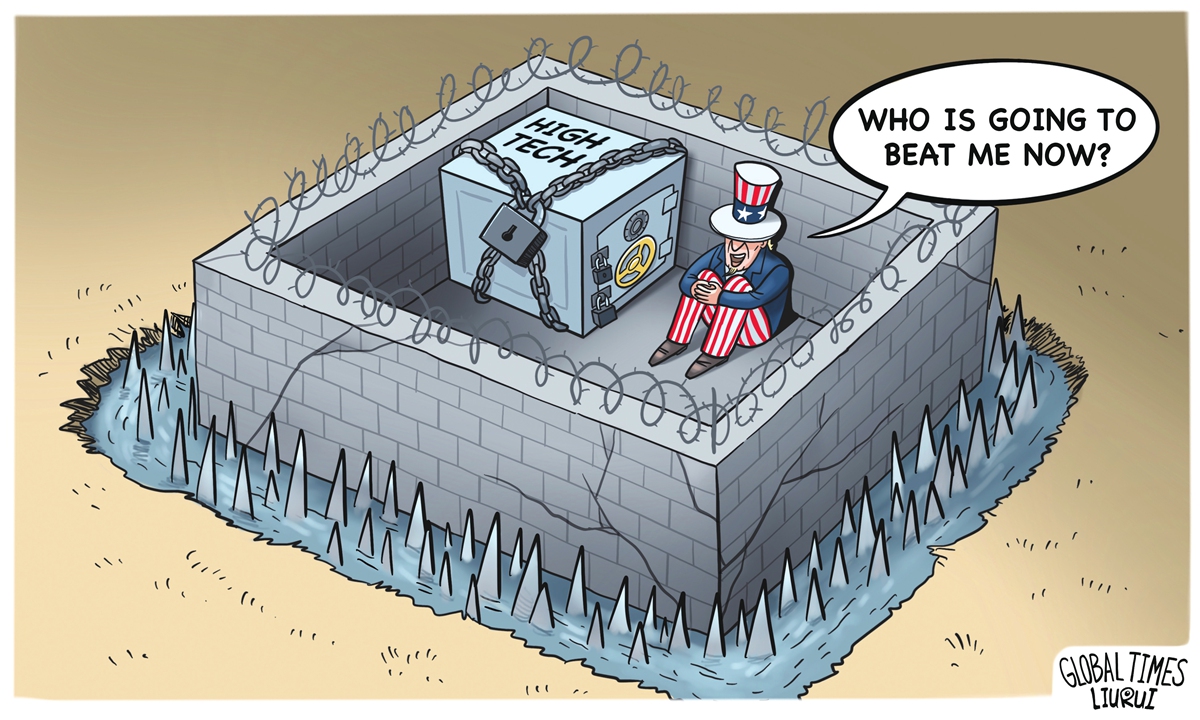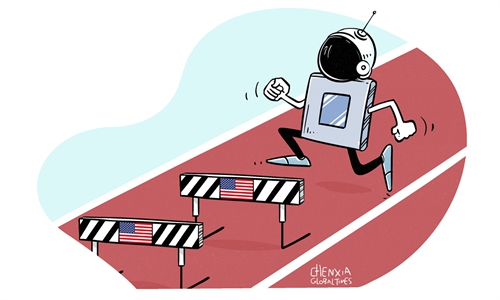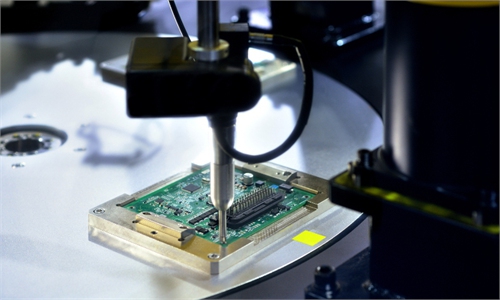Chinese chipmaker Fujian Jinhua welcomes US ruling; 'firms urged to safeguard rights amid unwarranted accusations'

Self-isolation. Illustration: Liu Rui /GT
Chinese chip producer Fujian Jinhua Integrated Circuit Co on Wednesday said that it welcomed a US court ruling, as the company was cleared of economic espionage and other criminal charges after being blacklisted by the US Commerce Department for more than five years.
Analysts said that many accusations made by the US against Chinese enterprises have been fabricated and were based on inferences, as political accusations have no bottom line. They said that the ruling was made based on facts and laws, while urging Chinese companies to take legal measures to protect their legitimate rights.
Fujian Jinhua was put on the US Entity List in 2018 amid former US president Donald Trump's trade war with China, with the US Commerce Department citing "a significant risk of becoming involved in activities that are contrary to the national security interests of the US."
On Tuesday, US District Judge Maxine M. Chesney in San Francisco found the company not guilty following a non-jury trial. The ruling may temper the Biden administration's pursuit of aggressive prosecutions to protect American technology, Bloomberg reported on Wednesday.
Chesney concluded that US prosecutors failed to prove that Fujian Jinhua misappropriated proprietary data from Micron Technology - America's largest memory chip producer.
In 2017, Micron sued Fujian Jinhua and Taiwan island-based United Microelectronics Corp in the US courts, accusing the two of stealing the company's memory chip trade secrets.
In December 2023, Micron said that it had reached a global settlement agreement with Fujian Jinhua, according to media reports.
The US Justice Department in 2018 announced an indictment against Fujian Jinhua regarding the trade secrets issue, and later the US Commerce Department added the firm to a list of entities that cannot buy components, software or technology goods from US firms.
Many allegations raised by the US against China might be overturned if they were actually heard in the US court system, as a lot of allegations have been fabricated and based on inference, He Weiwen, senior fellow from the Center for China and Globalization, told the Global Times on Wednesday.
Political accusations have no bottom line, said Li Yong, a senior research fellow at the China Association of International Trade.
Stamping rising Chinese enterprises with a bad name like 'spies' showed the how the US political ecosystem is like, and the smearing of Chinese companies demonstrated the bigotry driven by US politicians," Li told the Global Times on Wednesday.
According to the Bloomberg report, the verdict is significant because while the US has pursued and won numerous convictions of individuals for unlawfully transferring intellectual property to China, the Justice Department has rarely prosecuted Chinese companies in US courts.
The report noted that the case against Fujian Jinhua, filed in 2018 amid Trump's trade war with China, was touted as a high-profile effort to crack down on Chinese spying at US companies and research universities. The case was still in the courts when the Justice Department under the Biden administration ended Trump's "China Initiative" in 2022.
This ruling has a significant meaning as it can provide references for similar cases, Gao Lingyun, an expert at the Chinese Academy of Social Sciences who closely follows China-US trade issues, told the Global Times on Wednesday.
All three experts stressed the significance for Chinese enterprises to actively take measures to protect their legitimate rights in response to unwarranted sanctions and smears.
Chinese enterprises operate in accordance with regulations while advancing their technology and complying with legal requirements, Li said, adding that Chinese firms should utilize the law in response to politically driven smears.
Chinese experts and officials have repeatedly slammed the unreasonable US crackdown on Chinese enterprises, as such suppression will only harm normal trade and economic exchanges and interrupt global industry and supply chains.
Having a "small yard and high fence" will not stop China's innovation-driven development, nor will it do any good to US companies or the entire semiconductor industry, Mao Ning, Foreign Ministry spokesperson, told a press conference on Tuesday, commenting after Nvidia included Huawei among its current competitors in artificial intelligence, chips and various areas for the first time, which showed that its competitive position may be harmed if there are further changes in the US government's export controls.
The US needs to follow the principles of the market economy and fair competition, and support companies around the world in advancing science and technology through healthy competition, Mao said.



